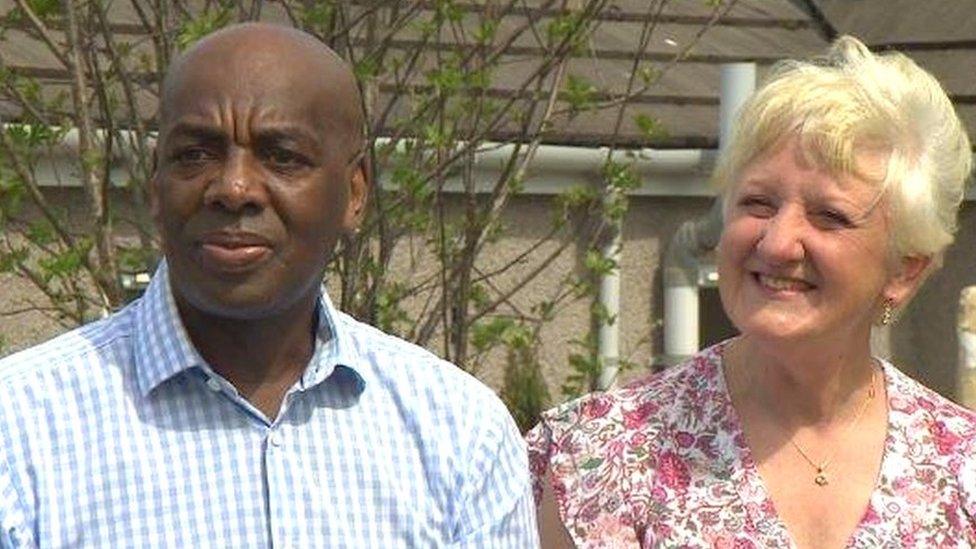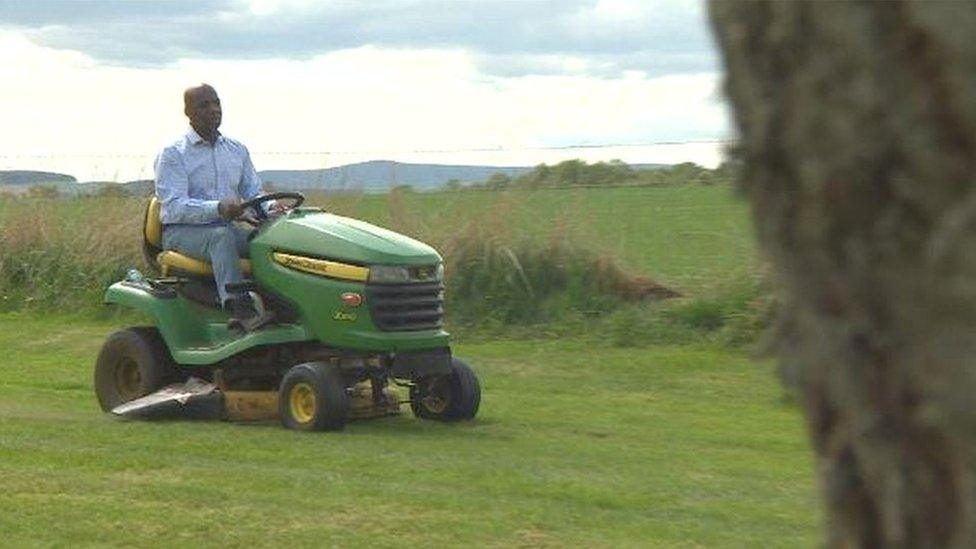Coronavirus: My life is so precious after three weeks in ICU
- Published

Rory Williams is now recovering at home with wife Celia
A man who spent three weeks in intensive care with coronavirus says it felt like he was drowning.
Rory Williams, 59, from Alford in Aberdeenshire, is now recuperating from the illness at home after 40 days in hospital.
He told BBC Scotland News he was so weak he could not even lift his mobile phone.
Thanking the NHS for his treatment, he said: "My life now is just, well it's so precious."
It started with fatigue, and a new cough.
Within days, he was admitted to hospital in Aberdeen, where he would spend three weeks in intensive care.
His wife Celia said of the early stages of treatment: "I did wonder afterwards, whether it would be the last time I spoke to him."
She explained: "It was very rapid, it felt for me anyway very rapid, from being fine, healthy and up and doing things, to being very ill."

Allow X content?
This article contains content provided by X. We ask for your permission before anything is loaded, as they may be using cookies and other technologies. You may want to read X’s cookie policy, external and privacy policy, external before accepting. To view this content choose ‘accept and continue’.

Mr Williams recalled: "Just gasping for air, and remembering to breathe. I just couldn't do anything - you know it felt like I was drowning.
"I was incredibly weak, just so so weak. My legs weren't my own.
"I lost two stone in weight, muscle wastage was just amazing. All my bones felt sharp."
He was put on a ventilator to support his breathing.
The length of time wearing the tightly fitting mask has left him scarred.
"I remember having this mask put on me, and I remember being so weak that I couldn't roll over even if I wanted to," he said.
"I couldn't pick up my mobile phone or anything like that I just couldn't move. Breathing was difficult and there was lots of bleeping of machines."

Mr Williams is now trying to get back to a more normal life
Mr Williams remembers very little of his time in intensive care at Aberdeen Royal Infirmary where he was treated by senior charge nurse Julie-Ann Vaughan.
She said: "Patients that actually come to intensive care are often in for a long time.
"With Rory we attempted initially not to put him on a ventilator but as his condition changed and he got more seriously ill, we tried non-invasive ventilation first for a few days.
"But unfortunately he didn't respond as well as we'd hoped so we had to intubate him."
'Like walking up aisle again'
After 40 days, he was finally well enough to leave hospital - when he was clapped out by the clinical staff.
Mr Williams said: "We had nurses either side of the aisle, I was on my walking sticks.
"Celia wasn't allowed to come in so she was standing outside the fire exit and she was standing there - it was like walking up the aisle again."
Now back at home, he is slowly getting back to normal tasks such as mowing the lawn.
He explained: "It was like being in a movie, to think that, you know I don't know what the odds are that I was the one who made it and all these poor people didn't make it.
"And I don't know why, well I do know because of the National Health (Service), all these doctors and nurses and their care but I'm no different to anybody else."

A SIMPLE GUIDE: How do I protect myself?
AVOIDING CONTACT: The rules on self-isolation and exercise
LOOK-UP TOOL: Check cases in your area
MAPS AND CHARTS: Visual guide to the outbreak
